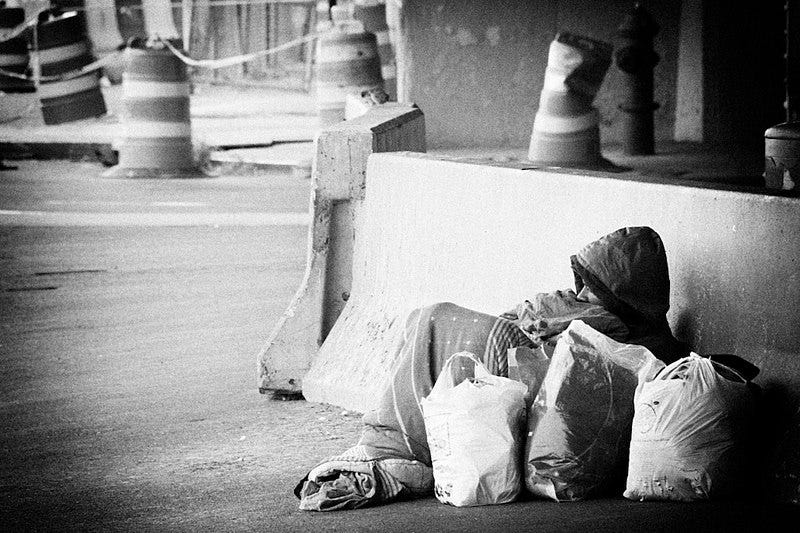Seven Quotes About Criminalizing Homelessness
Photo by JM Suarez via Wikimedia Commons
This week, the U.S. Supreme Court heard arguments on a landmark case about the rights of people experiencing homelessness. As discussed in a January issue of this newsletter, the case of Grants Pass v. Johnson will decide whether communities can legally fine, ban, or imprison people for sleeping on public property when there are not adequate shelter options available.
Prior lower court decisions have held that criminalizing homelessness for people who have nowhere else to go violates these people’s Eighth Amendment rights to be protected from cruel and unusual punishment.
The Supreme Court’s decision, expected in June, could be devastating. Cities across the country have shown they are eager to respond to the homelessness crisis not with housing and services, but with handcuffs and jail cells.
A silver lining to the case is that it has shone a spotlight on the ugly motivations behind criminalizing the state of being unhoused, along with the very human stories behind the struggles that have forced hundreds of thousands of our sisters and brothers to take refuge in tents and on the streets.
Particularly strong reporting came from the always-excellent housing journalist Rachel Cohen in Vox and Reis Thebault and Ann E. Marimow in the Washington Post. A compelling opinion essay was published in the New York Times by Laura Riley. A few months ago, Dr. Margot Kushel, an internal medicine physician, wrote an important piece in Truthout explaining her research debunking the myth that unhoused people prefer to live on the streets.
All of these articles are linked here and worth a full read. Here are seven quotes from them:
“Make it uncomfortable enough for them in our city so they will want to move on down the road.” Grants Pass City Council President explaining the intent of the anti-camping/anti-sleeping ordinance, as quoted by Riley.
“It wasn’t that long ago that I was part of the community . . . They’re not trying to make things better for us, or help us have another shelter, or keep us safe — or help us even medically or mentally. They’re just trying to push, push, push until we give up and say, ‘Fine, I’ll leave town.’” Laura Gutkoswki, sleeping in a Grants Pass park about a mile from her former house, as quoted by Thebault and Marimow.
“The original lead plaintiff for Grants Pass v. Johnson had over $5,000 in penalties for living outside, before she died at age 62.” (Grants Pass issued citations that started at $295 and rose as high as $1,250, plus a possible 30-day jail sentence.)—Cohen
“This case shines a light on the abdication of responsibility by governments at all levels to their unhoused residents. Instead of arguing about the legality of bans on sleeping in public, we should be asking: Why move people down the road to another community, one that is likely also short on shelter beds?”—Riley
“I believe that lawbreakers should be coerced into being law-abiding citizens.”—Brian Bouteller, director of the Gospel Rescue Mission in Grants Pass, as quoted by Thebault and Marimow. The Mission, the only large-scale transitional housing program in Grants Pass, requires twice-daily chapel attendance and abstinence from substances and romantic relationships. Grants Pass does not have a homeless shelter.
“Of the 426 individuals that researchers approached, only two individuals declined eligibility screening and one declined the offer. Everyone else accepted . . . This matches other studies showing that when people are offered permanent housing without requiring services, they not only accept and thrive but are more likely to accept treatment.”—Kushel
“The reality is if you ask people to move without there being somewhere to go, you’re not housing that individual and you’re in no way reducing or ending homelessness. And where will people go? They’ll go somewhere where police won’t find them that night and they’ll move again and again.”-- Charley Willison, a Cornell professor who has researched the criminalization of homelessness, as quoted by Cohen





